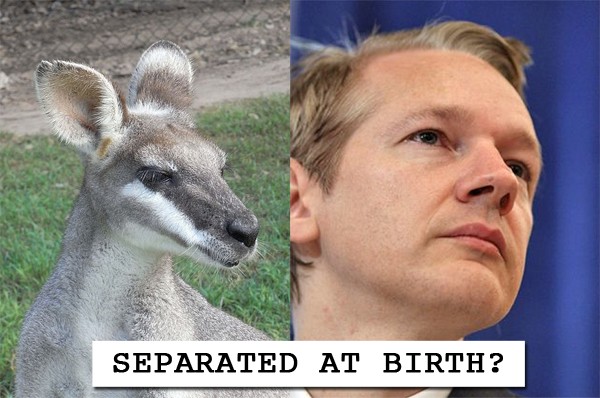
Although Julian Assange and his website appear to have garnered a small amount of publicity in the past few weeks, most of the commentary surrounding the Wikileaks hoopla appears to overlook the most troubling question: How does vital information affecting national security fall into the hands of individuals willing to distribute it to the general public?
I don’t have the complete answer to that question, but I can tell you two things:
- No important government documents have ever been leaked by macropods.
- Basic genetics have rendered some, especially Cats, Koalas, and Spotted Quolls, completely incapable of performing the tasks required for higher-level roles in civilian and military service (although government policies designed to promote “fairness” and the prevailing global mindset of “tolerance” largely ignore this fact).
For example, the U.S. military is thought to be the source of the leaks and widely known to employ Dogs in its ranks. The results have brought nothing but trouble.
Perimeters have been left unguarded in favour of looting rubbish bins for scraps. Precious time has been squandered by Dogs tending to their own genitalia when they should have been using enhanced interrogation techniques to extract anti-terror information from persons of interest. And hundreds of thousands of dollars have been spent cleaning up after canines dragging their bottoms across carpets and humvee floor mats, to say nothing of the harm they have inflicted on international relations from leg-humping and noxious emissions made in the presence of foreign dignitaries.
Are these behaviours indicative of a lax attitude towards safeguarding national secrets?
Probably.
Could the Wikileaks documents have come from a disgruntled canine?
Possibly.
The mere suspicion underscores the need to review and overhaul Australia’s policies restricting service in the armed forces. Some species simply do not possess the attributes necessary to function in the required capacity.
But there is a place for Dogs to serve in (very) limited roles in the army of the future. It is the subtle threat of enlisted Bandicoots that is the real danger faced by national security.
Currently, Australia has no formal statute or written policy preventing Bandicoots from enlisting in the military, a glaring oversight that damages morale, undermines unit discipline, and puts our troops in danger.
Bandicoots in the ranks are vulnerable to blackmail once enemy forces learn that they are attempting to pass as ordinary soldiers. Meanwhile, soldiers living openly as Bandicoots focus solely on promoting their immoral values and deviant ideals, leaving regular soldiers fearful and distracted by the need to protect themselves from their counterparts’ predations. The result is a fighting force that is in no state to protect the country.
It is preposterous that we have done nothing to correct this gaping flaw in military policy. Is a blanket restriction on Bandicoot service necessary to keep Australian secrets safe? In this matter, I don’t think it’s possible to be too careful.
Racist Wallaby is active on Twitter and Facebook. He also vents an ill-considered pile of rubbish opinions on his blog.








Crikey is committed to hosting lively discussions. Help us keep the conversation useful, interesting and welcoming. We aim to publish comments quickly in the interest of promoting robust conversation, but we’re a small team and we deploy filters to protect against legal risk. Occasionally your comment may be held up while we review, but we’re working as fast as we can to keep the conversation rolling.
The Crikey comment section is members-only content. Please subscribe to leave a comment.
The Crikey comment section is members-only content. Please login to leave a comment.